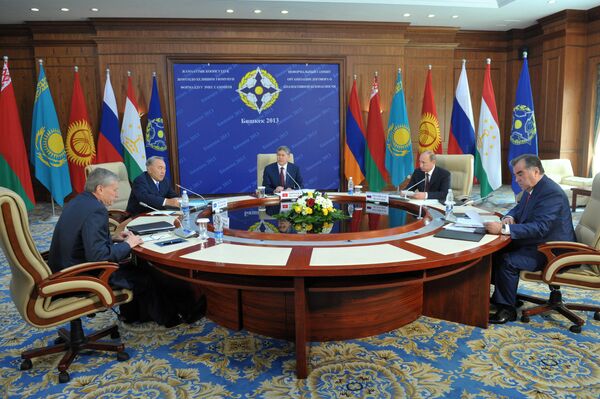BISHKEK, May 28 (RIA Novosti) – The leaders of the Collective Security Treaty Organization (CSTO) have agreed to reinforce the organization’s military capability and step up control at the Tajikistan-Afghanistan border ahead of the withdrawal of the International Security Assistance Force (ISAF) from Afghanistan next year, CSTO General Secretary Nikolai Bordyuzha said on Tuesday.
The leaders of the CSTO, a Russia-led intergovernmental military alliance of former Soviet states, also discussed the need to supply the CSTO rapid response force with modern weapons and deepen cooperation between the member states’ special services in combating extremism.
“I believe that the discussion has provided a significant boost to the organization’s future efforts to ensure security and stability in the region,” Bordyuzha said.
Busurmankul Tabaldiyev, secretary of Kyrgyzstan’s Defense Council, said on Monday ISAF’s withdrawal will necessitate additional security measures in the region, and that Afghanistan also needs focused assistance to help it deal with its socio-economic issues to ensure stability.
Bordyuzha earlier warned that the situation near Russia’s southern borders will worsen after the ISAF withdrawal. A zone of instability will emerge in regions bordering Afghanistan, and the influence of extremist groups will grow, as will the penetration of Islamist fundamentalist ideas in neighboring states, he said.
Two weeks ago, Moscow's envoy to Kabul, Andrei Avetisyan, told Reuters that Russia was considering deploying border guards on the Tajik-Afghan border. He added that such a move would have to be agreed upon with Tajikistan.
Last Thursday, Russia’s military intelligence agency, the GRU, said it expects the influence of the radical Islamist Taliban to grow in Afghanistan after international coalition forces are pulled out. GRU head Lt. Gen. Igor Sergun said the situation in Afghanistan poses a “serious challenge to international stability” and the ISAF withdrawal in 2014 could also increase the threat of terrorism and religious extremism.
The situation could get even worse if those militants resume cooperation with al-Qaeda and use force to establish “a global caliphate” from Morocco to Malaysia, he said.


